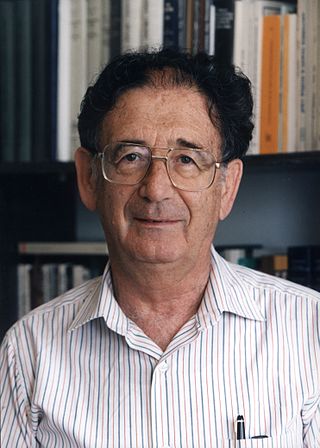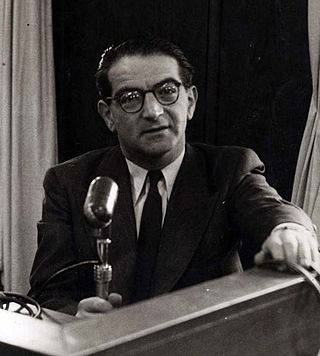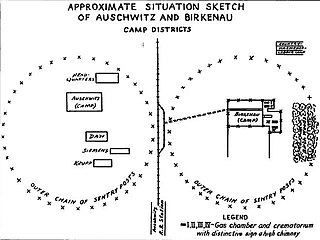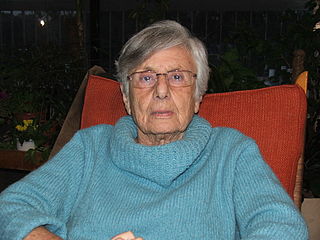Related Research Articles

Haaretz is an Israeli newspaper. It was founded in 1918, making it the longest running newspaper currently in print in Israel, and is now published in both Hebrew and English in the Berliner format. The English edition is published and sold together with the International New York Times. Both Hebrew and English editions can be read on the internet. In North America, it is published as a weekly newspaper, combining articles from the Friday edition with a roundup from the rest of the week. It is considered Israel's newspaper of record. It is known for its left-wing and liberal stances on domestic and foreign issues.

This is a selected bibliography and other resources for The Holocaust, including prominent primary sources, historical studies, notable survivor accounts and autobiographies, as well as other documentation and further hypotheses.
Alfréd Israel Wetzler, who wrote under the alias Jozef Lánik, was a Slovak Jewish writer. He is known for escaping from Auschwitz concentration camp and co-writing the Vrba-Wetzler Report, which helped halt the deportation of Jews from Hungary, saving up to 200,000 lives.

Yehuda Bauer is a Czech-born Israeli historian and scholar of the Holocaust. He is a professor of Holocaust Studies at the Avraham Harman Institute of Contemporary Jewry at the Hebrew University of Jerusalem.

Rezső Kasztner, also known as Rudolf Israel Kastner, was a Hungarian-Israeli journalist and lawyer who became known for having helped Jews escape from occupied Europe during the Holocaust. He was assassinated in 1957 after an Israeli court accused him of having collaborated with the Nazis.

The Kastner train consisted of 35 cattle wagons that left Budapest on 30 June 1944, during the German occupation of Hungary, carrying over 1,600 Jews temporarily to Bergen-Belsen and safety in Switzerland after large ransom paid by Swiss Orthodox Jew Yitzchak Sternbuch, Recha Sternbuch's husband. The train was named after Rudolf Kastner, a Hungarian-Jewish lawyer and journalist, who was a founding member of the Budapest Aid and Rescue Committee, a group that smuggled Jews out of occupied Europe during the Holocaust. Kastner negotiated with Adolf Eichmann, the German SS officer in charge of deporting Hungary's Jews to Auschwitz in German-occupied Poland, to allow over 1,600 Jews to escape in exchange for gold, diamonds, and cash.

Igael Tumarkin was an Israeli painter and sculptor.

The Auschwitz Protocols, also known as the Auschwitz Reports, and originally published as The Extermination Camps of Auschwitz and Birkenau, is a collection of three eyewitness accounts from 1943–1944 about the mass murder that was taking place inside the Auschwitz concentration camp in German-occupied Poland during the Second World War. The eyewitness accounts are individually known as the Vrba–Wetzler report, Polish Major's report, and Rosin-Mordowicz report.

The Vrba–Wetzler report is one of three documents that comprise what is known as the Auschwitz Protocols, otherwise known as the Auschwitz Report or the Auschwitz notebook. It is a 33-page eye-witness account of the Auschwitz concentration camp in German-occupied Poland during the Holocaust.

Rudolf "Rudi" Vrba was a Slovak-Jewish biochemist who, as a teenager in 1942, was deported to the Auschwitz concentration camp in German-occupied Poland. He escaped from the camp in April 1944, at the height of the Holocaust, and co-wrote a detailed report about the mass murder taking place there. Distribution of the report by George Mantello in Switzerland is credited with having halted the mass deportation of Hungary's Jews to Auschwitz in July 1944, saving more than 200,000 lives. After the war, Vrba trained as a biochemist, working mostly in England and Canada.

Nakam was a paramilitary organization of about fifty Holocaust survivors who, after 1945, sought genocidal revenge for the murder of six million Jews during the Holocaust. Led by Abba Kovner, the group sought to kill six million German people in a form of indiscriminate revenge, "a nation for a nation". Kovner went to Mandatory Palestine in order to secure large quantities of poison for poisoning water mains to kill large numbers of Germans. His followers infiltrated the water system of Nuremberg. However, Kovner was arrested upon arrival in the British Zone of Occupied Germany and had to throw the poison overboard.

Yoav Gelber is a professor of history at the University of Haifa, and was formerly a visiting professor at The University of Texas at Austin.

The Attorney-General of the Government of Israel v. Malchiel Gruenwald, commonly known as the Kastner trial, was a libel case in Jerusalem, Israel. Hearings were held from 1 January to October 1954 in the District Court of Jerusalem before Judge Benjamin Halevi (1910–1996), who published his decision on 22 June 1955.
Gilad Margalit was an Israeli historian, writer, and professor in the Department of General History at the University of Haifa.

The Holocaust in Hungary was the dispossession, deportation, and systematic murder of more than half of the Hungarian Jews, primarily after the German occupation of Hungary in March 1944.

Yisrael Kristal was a Polish-Israeli supercentenarian recognized in 2014 as the oldest living Holocaust survivor. After the death of Yasutaro Koide, of Japan, on 18 January 2016, he was also recognized as the oldest living man in the world as well as one of the ten oldest men ever at his death at age 113 years and 330 days.

Ruth Bondy was a Czech-Israeli journalist and translator. Bondy was a Holocaust survivor who wrote for the Israeli newspaper Davar and translated books written in Czech to Hebrew. She was awarded the Sokolov Award in 1987 and the Tchernichovsky Prize in 2014.

On the night of 5 April 1944, Siegfried Lederer, a Czech Jew, escaped from the Auschwitz concentration camp wearing an SS uniform provided by SS-Rottenführer Viktor Pestek. Pestek opposed the Holocaust; he was a devout Catholic and was infatuated with Renée Neumann, a Jewish prisoner. Pestek accompanied Lederer out of the camp, and the two men traveled together to the Protectorate of Bohemia and Moravia to obtain false documents for Neumann and her mother.
Czesław Mordowicz was a Polish Jew who, with Arnošt Rosin, escaped from the Auschwitz concentration camp in German-occupied Poland on 27 May 1944, at the height of the Holocaust. A seven-page report dictated by Mordowicz and Rosin joined the Vrba–Wetzler report and a report by Jerzy Tabeau to become the Auschwitz Protocols, a detailed account of the mass murder taking place inside the camp.
Jirmejahu Oskar Neumann (1894–1981), also known as Oscar Neumann, was a Czech lawyer and writer in Bratislava, part of the Slovak State between 1939–1945. From December 1943, during the Holocaust, he served as president of the Slovak Judenrat.
References
- 1 2 "Erik Erikson Early Career Award: Past winners". International Society of Political Psychology. Archived from the original on 15 April 2013.
- 1 2 "Prof. Ruth Linn". University of Haifa. Archived from the original on 8 July 2015.
- ↑ Laor, Yitzhak (26 December 2004). "Auschwitz, they tell me you've become popular". Haaretz.
- 1 2 3 Dromi, Uri (30 January 2005). "Deaf Ears, Blind Eyes". Haaretz. Linn, Ruth (24 February 2005). "Regarding 'Deaf ears, blind eyes,' Haaretz Magazine, January 28". Haaretz.
- ↑ Linn, Ruth (2004). Escaping Auschwitz: A Culture of Forgetting . Ithaca: Cornell University Press. p. 5. ISBN 9780801441301.
- ↑ Linn, Ruth (2002). Mature Unwed Mothers: Narratives of Moral Resistance. New York: Kluwer Academic/Plenum Publishers. p. 2.
- 1 2 Linn, Ruth (1996). "When the Individual Soldier Says 'No' to War: A Look at Selective Refusal During the Intifada". Journal of Peace Research. 33(4): 421–431 (431). JSTOR 424567
- ↑ Aronson, Shlomo. (2005). "Escaping Auschwitz: A Culture of Forgetting, by Ruth Linn". Contemporary Sociology: A Journal of Reviews, 34(5), 540–541. doi : 10.1177/009430610503400552
- ↑ "Professor Ruth Linn talk". New York University School of Law.
- ↑ Linn, Ruth (1989). Not Shooting and Not Crying: Psychological Inquiry into Moral Disobedience . New York: Greenwood Press. p. xi. ISBN 9780313264979.